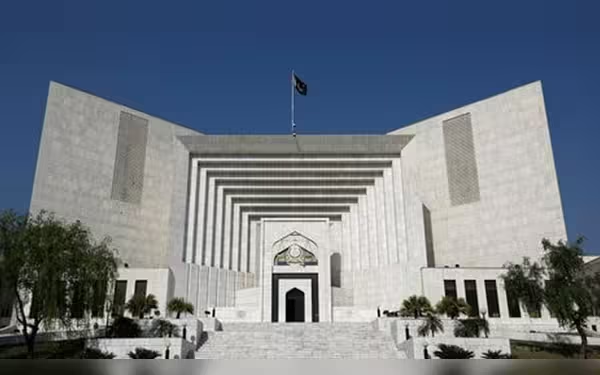Saturday, November 16, 2024 10:01 PM
Imran Khan's Lawyer Ali Zafar Boycotts Supreme Court Hearing on Article 63(A)
- Ali Zafar refuses to participate in Supreme Court proceedings.
- CJP warns of contempt for suggesting horse-trading.
- Court reviews Article 63(A) implications for political accountability.
 Image Credits: geo
Image Credits: geoImran Khan's lawyer Ali Zafar boycotts Supreme Court hearing on Article 63(A), raising concerns over political accountability and judicial integrity.
The ongoing legal battle surrounding Article 63(A) of the Constitution of Pakistan has taken a significant turn as the Supreme Court Bar Association (SCBA) presented a plea before the Supreme Court. This case is pivotal as it addresses the issue of whether the votes of parliamentarians who stray from their party's directives should be counted. The Supreme Court, led by Chief Justice of Pakistan (CJP) Qazi Faez Isa, has announced a unanimous verdict to approve the review petition, with a detailed verdict to follow.
During the recent hearing, Barrister Ali Zafar, representing the Pakistan Tehreek-e-Insaf (PTI), informed the court about his meeting with the party's founder, Imran Khan. However, he clarified that this meeting did not maintain attorney-client privilege due to the presence of police officers. Khan, currently incarcerated, has expressed a desire to appear before the court virtually to present his arguments. Zafar reiterated the party's opposition to the current five-member bench, claiming it was improperly constituted, and stated that the PTI would not participate in the proceedings.
Chief Justice Isa responded sternly to Zafar's repeated references to Khan, urging him to refrain from mentioning names during the proceedings. The CJP also warned Zafar about potential contempt of court charges for suggesting that the court might allow horse-trading in light of upcoming constitutional amendments. This warning underscores the seriousness with which the court views the integrity of its proceedings.
In a surprising turn, the court appointed Barrister Zafar as amicus curiae, allowing him to continue his arguments after the SCBA President expressed no opposition to this decision. CJP Isa emphasized the importance of political parties collaborating to resolve their issues, asserting that there is no division among judges.
The case traces its roots back to a reference filed by the PTI government in 2022, seeking the Supreme Court's opinion on Article 63(A) to combat defections and enhance democratic accountability. The apex court had previously ruled against defections, stating that lawmakers must adhere to their party's policies when voting. This ruling was contentious, with a split decision among the judges, leading to the SCBA's plea to review the court's interpretation.
The implications of this case are profound, particularly for the ruling coalition government, which is currently pursuing constitutional amendments. These amendments include the establishment of a constitutional court and an extension of judges' retirement ages. However, the government faces challenges in securing the necessary two-thirds majority in both houses of parliament, even as it seeks support from various political factions.
As the legal proceedings unfold, the potential for political maneuvering remains high. If the Supreme Court rules that the votes of dissident lawmakers can be counted, it could pave the way for the government to attract support from PTI lawmakers, thereby facilitating the proposed constitutional amendments. This scenario highlights the intricate relationship between law and politics in Pakistan, where judicial decisions can significantly influence the political landscape.
The ongoing deliberations in the Supreme Court regarding Article 63(A) not only reflect the complexities of Pakistan's political environment but also underscore the critical role of the judiciary in shaping democratic processes. As the nation watches closely, the outcomes of these proceedings will undoubtedly have lasting implications for the future of governance and political accountability in Pakistan.













